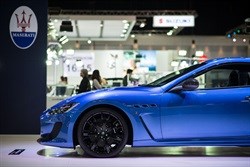South Africa's retail sector has seen mixed fortunes in recent months with a slowdown in vehicle sales, but more encouraging news in luxury goods. New passenger vehicle sales, which constitute just under two-thirds of overall automotive sales, fell by 4.8% year-on-year (y-o-y) in June, on top of a 5.4% y-o-y decline in May, according to the Department of Trade and Industry. This was in addition to a slowdown in commercial vehicle sales, which fell by 1.2% in June, with year-to-date sales down by just under 2% versus the same period last year.
Auto sales - a key indicator of household spending health - have been slowing more generally since the start of the year, in part a result of a weaker rand, rising consumer indebtedness and dropping consumer confidence. According to a survey commissioned by local lender First National Bank, conducted by the Bureau for Economic Research, consumer confidence has fallen to a 14-year low with confidence worsening over the second quarter. In addition, there was a meaningful decline in confidence among high- and middle-income earners over the first half of the year according to a research note by local investment bank Investec.
The continuing weakness of the rand, which has dropped by about 5% against the dollar since the start of the year, has not helped. The weak rand has exacerbated inflation, which hit 4.6% in May. Indeed, rising inflation was one of the factors that led to weak retail sales data in May, which grew by 2.4% y-o-y, missing expectations of 2.5%, after expanding 3.4% in April, according to Statistics South Africa. Expected hikes in energy tariffs, along with a bad drought - one of the worst in over 20 years - and more expensive imports have also slowed household consumption.
Luxury goods
However, one segment that is proving more durable is the luxury end of the retail spectrum, in part a function of the improved regional environment. The African luxury goods market is still comparatively smaller than in other regions, but is growing at a faster rate. According to consultancy Bain & Co, the global luxury market was worth 217 billion euros in 2013, with Africa accounting for just under 1%, or 1.5 to 2 billion euros - half of which came from South Africa. Bain forecasts double-digit luxury sales growth for the continent, with strong demand for 'hard' luxury items, such as jewellery and cars.
In spite of the broader economic headwinds that the country is facing, the rising demand for high-value purchases is being reflected in domestic sales. According to Julie Lundin, local branch head of Panerai, a premium watch brand owned by Richemont, there is a growing demand for quality products among the rising upper-middle class. "South Africa has an aspirant younger generation prepared to show success by driving a nice car, having watches, jewellery, fashion," Lundin told OBG.
However, high duties on some imports and the volatility of the rand can affect pricing policy, she said, resulting in price swings that contrast to the stability in other markets, such as Europe. Though the top end of the retail market is somewhat insulated from the downturn in the local and international economy, Lundin said the luxury segment was still feeling the impact of tougher times, with one example of this being a significant drop in the number of Chinese customers.
Chinese tourist arrivals down
PwC, in its 2013 Destination Africa publication, reported that Chinese visitors to South Africa spend around R15,000 ($1420) per trip, which was well in excess of the R9000 ($852) average. However, Chinese tourist arrivals fell by 32.4% y-o-y in the 12 months to February 2015, a far sharper decline than the 7.2% drop in overall inbound numbers, according to a Statistics South Africa report issued in mid-June. This fall is in part due to changes in visa requirements but is also attributable to the slowing of the Chinese economy.
However, the country may be well placed to tap into high-nett-worth visitors from markets closer to home, including Nigeria and Angola. Thulani Nzima, CEO of South Africa Tourism, told OBG last year: "What surprises some people when talking about African potential is that, not only is the base big, but that Africans are also proportionately big spenders."
Rens Rademeyer, GM of Italian car maker Maserati in Joburg, agreed, saying that South Africa had an increasing appeal to Africans from other nations in the higher wealth brackets, given its established infrastructure for luxury goods and vehicles. "There is a lot of money in the continent, but it seems the high-nett-worth individuals will either spend their wealth in Europe or come to South Africa," he told OBG.

































